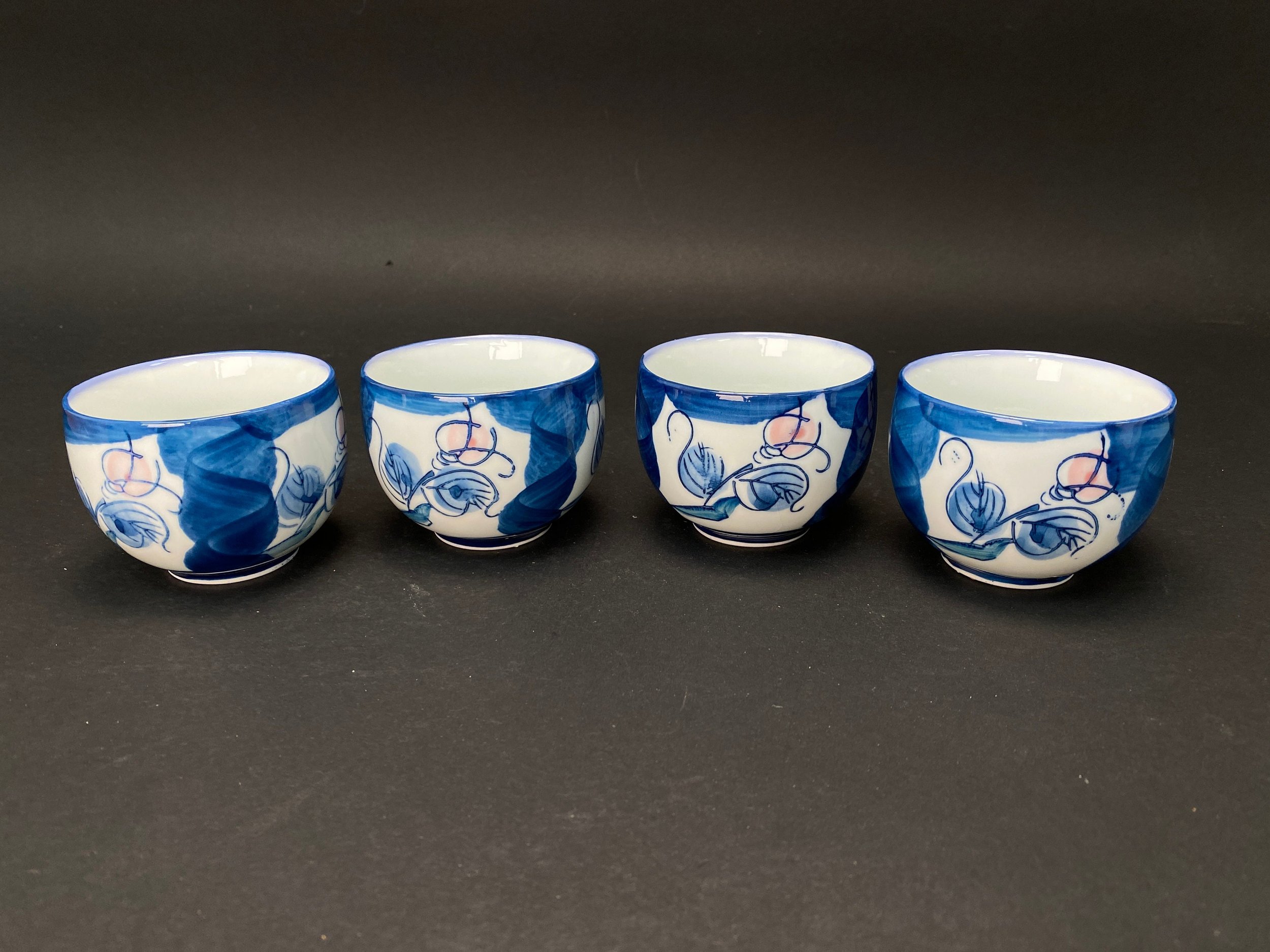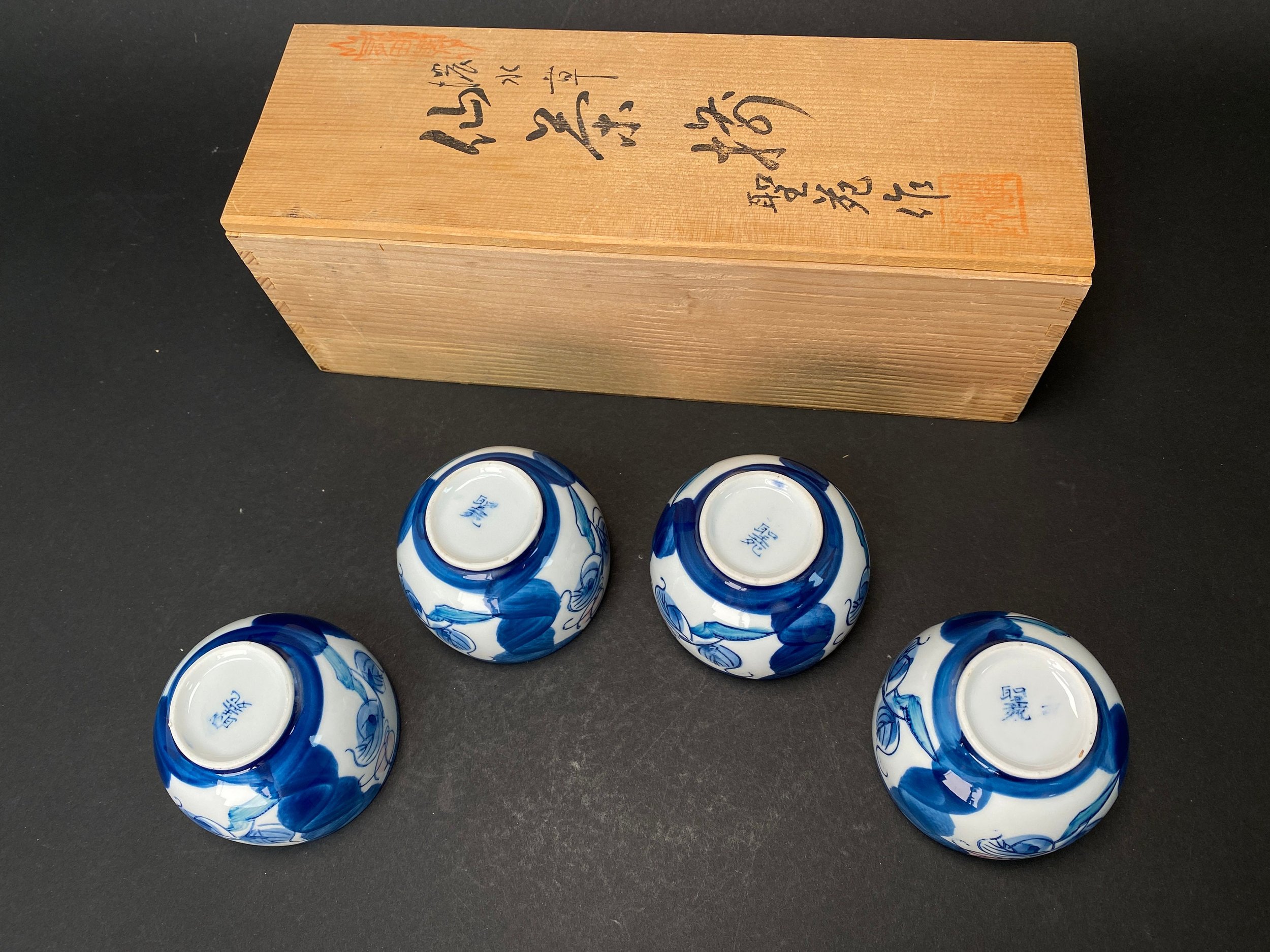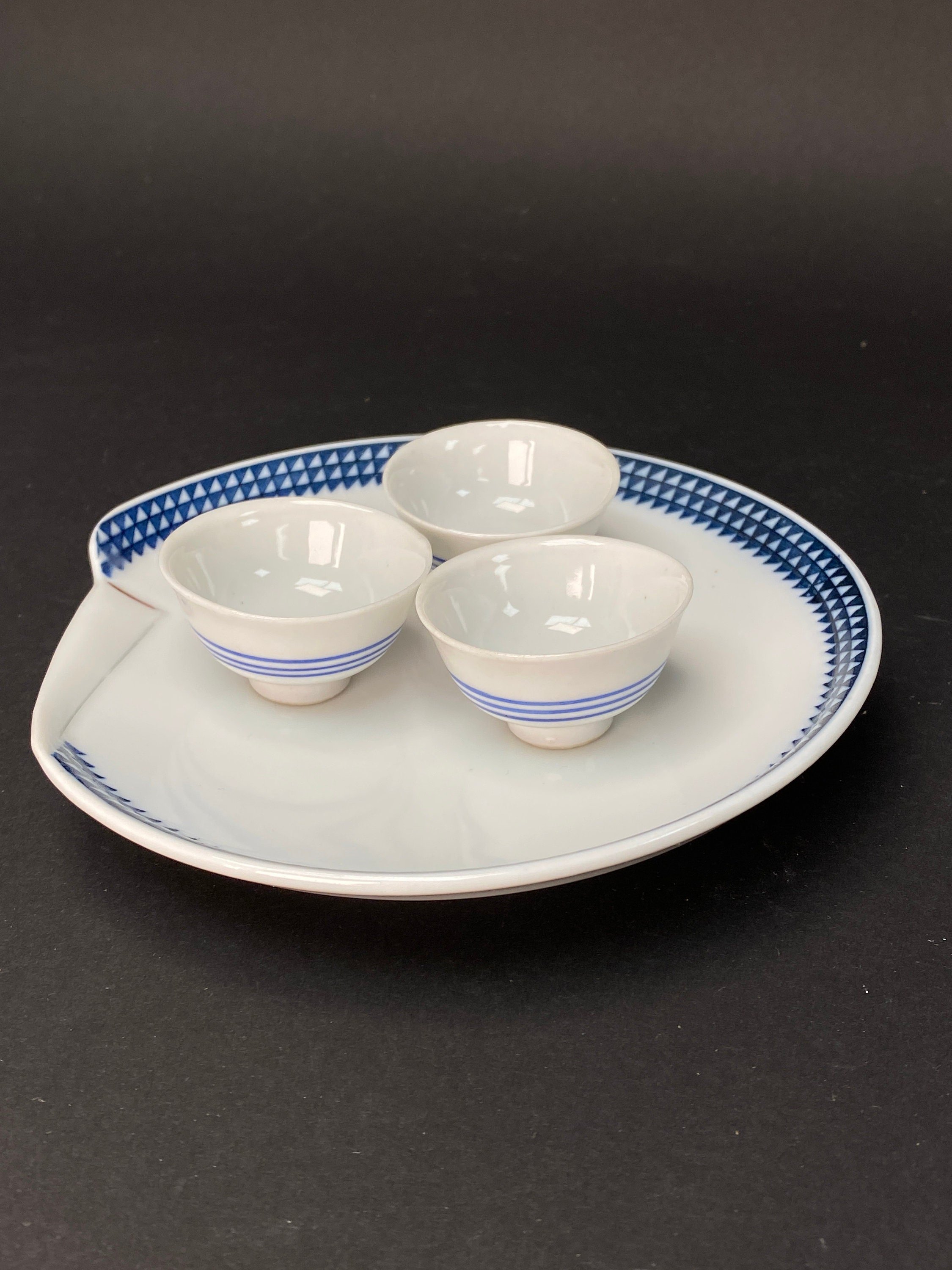 Image 1 of 6
Image 1 of 6

 Image 2 of 6
Image 2 of 6

 Image 3 of 6
Image 3 of 6

 Image 4 of 6
Image 4 of 6

 Image 5 of 6
Image 5 of 6

 Image 6 of 6
Image 6 of 6







Set of 4 Japanese Tea Cups signed by Hijiri En, with original wood box signed, Rose pattern, Yunomi Blue & White, in Open Box Condition
$45.30
This set of 4 Tea Cups signed, Yunomi with Maker Hijiri En mark on the bottom. No chips or cracks and is in OPEN BOX condition.Each one is unique and slightly different on Rose patterns, but similar.
They are made in Japan. UNUSED OPNE BOX.
Details:
-Material: Porcelain
-No chips or cracks
-Condition: Reserved Vintage. Mint. Open Box in Storage.
-Approximate Size: Dia 3"(7.5cm) × H 2 1/4"(5.5 cm)
-Approximate Weight: 2 lbs (box includd)
-Japanese Tea Cup called Yunomi
-Message us if you need combine shipping.
*Fast Shipping From US. No more Waiting from Japan
*Follow us for MORE. We update almost EVERYDAY!
Hagi ware (called Hagi Yaki in Japanese) is a form of porcelain produced mainly in the city of Hagi in Yamaguchi prefecture. Hagi ware is rarely decorated, remaining as simple as possible to make the most of the features of the clay. This simplicity creates a unique texture where no two Hagi ware items are the same. The individuality of this porcelain is produced by deep cracks in the clay expanding and contracting the enamel. This results in variations and color changes on the potteries surface called "the seven disguises" (Nanabake). Hagi ware also changes color during its firing, bringing it an unpredictable final touch. Hagi ware is often used for tea bowls that typically have a notched foot. The notched foot design was brought to Japan by the Korean Joseon dynasty (1392-1897) which is also the origin of Hagi ware. There are various theories about the purpose of the notched foot but for Hagi ware, which is otherwise not decorated, they are an important component that changes the whole look of the pottery. Hagi ware uses a clay made of three different soils (daidou, mishima and mitake) which are all extracted from different places. This clay does not shrink much when firing and has a nice texture with excellent heat retention, which is why it is chosen for producing tea ware.
The origins of Hagi ware can be traced back to the arrival of Korean potters to Hagi, a quaint town situated in Yamaguchi Prefecture on the Japan Sea, following Japan’s military invasion of the Korean peninsula in the late 16th century. As a result, a large number of Korean craftsmen were abducted and transported to Japan, where they played a crucial role in establishing new pottery types such as Satsuma, Arita, and Hagi ware.
They are made in Japan. UNUSED OPNE BOX.
Details:
-Material: Porcelain
-No chips or cracks
-Condition: Reserved Vintage. Mint. Open Box in Storage.
-Approximate Size: Dia 3"(7.5cm) × H 2 1/4"(5.5 cm)
-Approximate Weight: 2 lbs (box includd)
-Japanese Tea Cup called Yunomi
-Message us if you need combine shipping.
*Fast Shipping From US. No more Waiting from Japan
*Follow us for MORE. We update almost EVERYDAY!
Hagi ware (called Hagi Yaki in Japanese) is a form of porcelain produced mainly in the city of Hagi in Yamaguchi prefecture. Hagi ware is rarely decorated, remaining as simple as possible to make the most of the features of the clay. This simplicity creates a unique texture where no two Hagi ware items are the same. The individuality of this porcelain is produced by deep cracks in the clay expanding and contracting the enamel. This results in variations and color changes on the potteries surface called "the seven disguises" (Nanabake). Hagi ware also changes color during its firing, bringing it an unpredictable final touch. Hagi ware is often used for tea bowls that typically have a notched foot. The notched foot design was brought to Japan by the Korean Joseon dynasty (1392-1897) which is also the origin of Hagi ware. There are various theories about the purpose of the notched foot but for Hagi ware, which is otherwise not decorated, they are an important component that changes the whole look of the pottery. Hagi ware uses a clay made of three different soils (daidou, mishima and mitake) which are all extracted from different places. This clay does not shrink much when firing and has a nice texture with excellent heat retention, which is why it is chosen for producing tea ware.
The origins of Hagi ware can be traced back to the arrival of Korean potters to Hagi, a quaint town situated in Yamaguchi Prefecture on the Japan Sea, following Japan’s military invasion of the Korean peninsula in the late 16th century. As a result, a large number of Korean craftsmen were abducted and transported to Japan, where they played a crucial role in establishing new pottery types such as Satsuma, Arita, and Hagi ware.
Add To Cart
This set of 4 Tea Cups signed, Yunomi with Maker Hijiri En mark on the bottom. No chips or cracks and is in OPEN BOX condition.Each one is unique and slightly different on Rose patterns, but similar.
They are made in Japan. UNUSED OPNE BOX.
Details:
-Material: Porcelain
-No chips or cracks
-Condition: Reserved Vintage. Mint. Open Box in Storage.
-Approximate Size: Dia 3"(7.5cm) × H 2 1/4"(5.5 cm)
-Approximate Weight: 2 lbs (box includd)
-Japanese Tea Cup called Yunomi
-Message us if you need combine shipping.
*Fast Shipping From US. No more Waiting from Japan
*Follow us for MORE. We update almost EVERYDAY!
Hagi ware (called Hagi Yaki in Japanese) is a form of porcelain produced mainly in the city of Hagi in Yamaguchi prefecture. Hagi ware is rarely decorated, remaining as simple as possible to make the most of the features of the clay. This simplicity creates a unique texture where no two Hagi ware items are the same. The individuality of this porcelain is produced by deep cracks in the clay expanding and contracting the enamel. This results in variations and color changes on the potteries surface called "the seven disguises" (Nanabake). Hagi ware also changes color during its firing, bringing it an unpredictable final touch. Hagi ware is often used for tea bowls that typically have a notched foot. The notched foot design was brought to Japan by the Korean Joseon dynasty (1392-1897) which is also the origin of Hagi ware. There are various theories about the purpose of the notched foot but for Hagi ware, which is otherwise not decorated, they are an important component that changes the whole look of the pottery. Hagi ware uses a clay made of three different soils (daidou, mishima and mitake) which are all extracted from different places. This clay does not shrink much when firing and has a nice texture with excellent heat retention, which is why it is chosen for producing tea ware.
The origins of Hagi ware can be traced back to the arrival of Korean potters to Hagi, a quaint town situated in Yamaguchi Prefecture on the Japan Sea, following Japan’s military invasion of the Korean peninsula in the late 16th century. As a result, a large number of Korean craftsmen were abducted and transported to Japan, where they played a crucial role in establishing new pottery types such as Satsuma, Arita, and Hagi ware.
They are made in Japan. UNUSED OPNE BOX.
Details:
-Material: Porcelain
-No chips or cracks
-Condition: Reserved Vintage. Mint. Open Box in Storage.
-Approximate Size: Dia 3"(7.5cm) × H 2 1/4"(5.5 cm)
-Approximate Weight: 2 lbs (box includd)
-Japanese Tea Cup called Yunomi
-Message us if you need combine shipping.
*Fast Shipping From US. No more Waiting from Japan
*Follow us for MORE. We update almost EVERYDAY!
Hagi ware (called Hagi Yaki in Japanese) is a form of porcelain produced mainly in the city of Hagi in Yamaguchi prefecture. Hagi ware is rarely decorated, remaining as simple as possible to make the most of the features of the clay. This simplicity creates a unique texture where no two Hagi ware items are the same. The individuality of this porcelain is produced by deep cracks in the clay expanding and contracting the enamel. This results in variations and color changes on the potteries surface called "the seven disguises" (Nanabake). Hagi ware also changes color during its firing, bringing it an unpredictable final touch. Hagi ware is often used for tea bowls that typically have a notched foot. The notched foot design was brought to Japan by the Korean Joseon dynasty (1392-1897) which is also the origin of Hagi ware. There are various theories about the purpose of the notched foot but for Hagi ware, which is otherwise not decorated, they are an important component that changes the whole look of the pottery. Hagi ware uses a clay made of three different soils (daidou, mishima and mitake) which are all extracted from different places. This clay does not shrink much when firing and has a nice texture with excellent heat retention, which is why it is chosen for producing tea ware.
The origins of Hagi ware can be traced back to the arrival of Korean potters to Hagi, a quaint town situated in Yamaguchi Prefecture on the Japan Sea, following Japan’s military invasion of the Korean peninsula in the late 16th century. As a result, a large number of Korean craftsmen were abducted and transported to Japan, where they played a crucial role in establishing new pottery types such as Satsuma, Arita, and Hagi ware.
This set of 4 Tea Cups signed, Yunomi with Maker Hijiri En mark on the bottom. No chips or cracks and is in OPEN BOX condition.Each one is unique and slightly different on Rose patterns, but similar.
They are made in Japan. UNUSED OPNE BOX.
Details:
-Material: Porcelain
-No chips or cracks
-Condition: Reserved Vintage. Mint. Open Box in Storage.
-Approximate Size: Dia 3"(7.5cm) × H 2 1/4"(5.5 cm)
-Approximate Weight: 2 lbs (box includd)
-Japanese Tea Cup called Yunomi
-Message us if you need combine shipping.
*Fast Shipping From US. No more Waiting from Japan
*Follow us for MORE. We update almost EVERYDAY!
Hagi ware (called Hagi Yaki in Japanese) is a form of porcelain produced mainly in the city of Hagi in Yamaguchi prefecture. Hagi ware is rarely decorated, remaining as simple as possible to make the most of the features of the clay. This simplicity creates a unique texture where no two Hagi ware items are the same. The individuality of this porcelain is produced by deep cracks in the clay expanding and contracting the enamel. This results in variations and color changes on the potteries surface called "the seven disguises" (Nanabake). Hagi ware also changes color during its firing, bringing it an unpredictable final touch. Hagi ware is often used for tea bowls that typically have a notched foot. The notched foot design was brought to Japan by the Korean Joseon dynasty (1392-1897) which is also the origin of Hagi ware. There are various theories about the purpose of the notched foot but for Hagi ware, which is otherwise not decorated, they are an important component that changes the whole look of the pottery. Hagi ware uses a clay made of three different soils (daidou, mishima and mitake) which are all extracted from different places. This clay does not shrink much when firing and has a nice texture with excellent heat retention, which is why it is chosen for producing tea ware.
The origins of Hagi ware can be traced back to the arrival of Korean potters to Hagi, a quaint town situated in Yamaguchi Prefecture on the Japan Sea, following Japan’s military invasion of the Korean peninsula in the late 16th century. As a result, a large number of Korean craftsmen were abducted and transported to Japan, where they played a crucial role in establishing new pottery types such as Satsuma, Arita, and Hagi ware.
They are made in Japan. UNUSED OPNE BOX.
Details:
-Material: Porcelain
-No chips or cracks
-Condition: Reserved Vintage. Mint. Open Box in Storage.
-Approximate Size: Dia 3"(7.5cm) × H 2 1/4"(5.5 cm)
-Approximate Weight: 2 lbs (box includd)
-Japanese Tea Cup called Yunomi
-Message us if you need combine shipping.
*Fast Shipping From US. No more Waiting from Japan
*Follow us for MORE. We update almost EVERYDAY!
Hagi ware (called Hagi Yaki in Japanese) is a form of porcelain produced mainly in the city of Hagi in Yamaguchi prefecture. Hagi ware is rarely decorated, remaining as simple as possible to make the most of the features of the clay. This simplicity creates a unique texture where no two Hagi ware items are the same. The individuality of this porcelain is produced by deep cracks in the clay expanding and contracting the enamel. This results in variations and color changes on the potteries surface called "the seven disguises" (Nanabake). Hagi ware also changes color during its firing, bringing it an unpredictable final touch. Hagi ware is often used for tea bowls that typically have a notched foot. The notched foot design was brought to Japan by the Korean Joseon dynasty (1392-1897) which is also the origin of Hagi ware. There are various theories about the purpose of the notched foot but for Hagi ware, which is otherwise not decorated, they are an important component that changes the whole look of the pottery. Hagi ware uses a clay made of three different soils (daidou, mishima and mitake) which are all extracted from different places. This clay does not shrink much when firing and has a nice texture with excellent heat retention, which is why it is chosen for producing tea ware.
The origins of Hagi ware can be traced back to the arrival of Korean potters to Hagi, a quaint town situated in Yamaguchi Prefecture on the Japan Sea, following Japan’s military invasion of the Korean peninsula in the late 16th century. As a result, a large number of Korean craftsmen were abducted and transported to Japan, where they played a crucial role in establishing new pottery types such as Satsuma, Arita, and Hagi ware.
You Might Also Like










Hagi yaki ware Sake Set, Japanese Famous maker Tokkuri and 1 Sake cup, Hagiware, made in Japan!
$52.00










Japan Vintage Coffee Bone China set of 2 Cups and Saucers by Cosmo Garden, Made in Japan, vintage cafe set
$43.60


